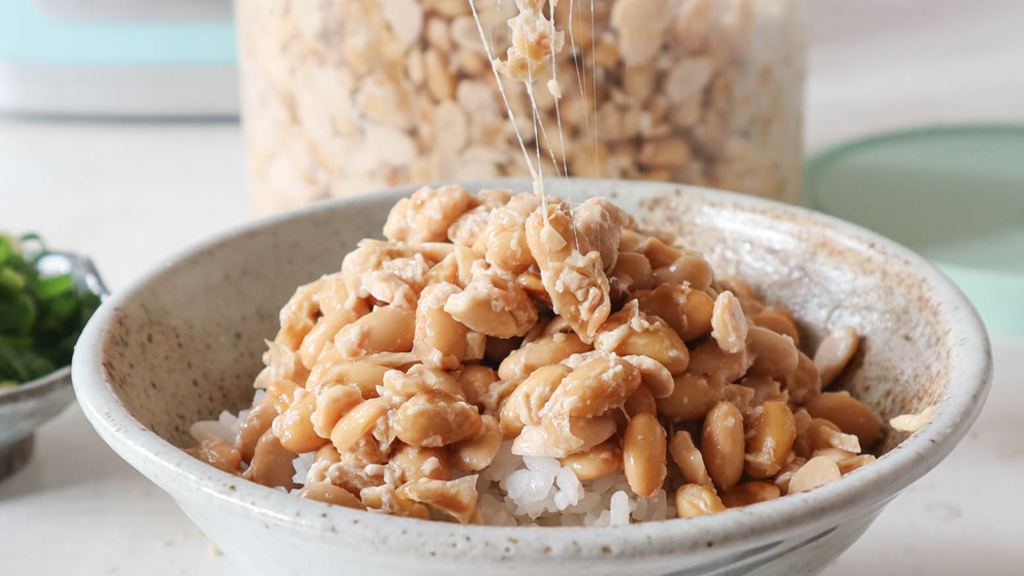Your Cart is Empty

How to make Natto (fermented soybeans) in a yogurt maker
Barb Hodgens
Barb Hodgens loves to cook with alternative, healthy whole food ingredients, with a focus on gut health. Barb has overcome her own gut health issues through healthy eating. Share your ideas, comments and photos at the end of this post :)

A probiotic superfood from Japan.
Natto is a traditional Japanese food made from fermented soybeans. It’s a nutritious and healthy food full of beneficial bacteria that is usually eaten for breakfast. Japanese people either love Natto or seriously dislike it. To appreciate this very distinctive delicacy, you need to get past the smell and unusual slimy texture. It’s an acquired taste and may not be something you are able to enjoy the first time you try it.
If you own a Luvele pure plus yogurt maker and are willing to take on a food challenge, stay tuned for some fermenting fun. The process takes several days; however, the hands-on-time is minimal and not at all difficult.
Natto preparation requires a sterile and stable environment under anaerobic conditions. The Luvele Pure Plus yogurt maker, with glass jar and water-bath technology makes the process failsafe. Follow this step-by-step method to make authentic Japanese Natto at home. All you need is a dash of Natto starter powder and boiled (or steamed) soybeans. If you’re not able to buy a Natto starter in your area, you can buy store bought Natto from an Asian grocers and use a portion of that instead.

HOW TO EAT NATTO
Natto is almost always eaten over rice. If plain Natto is too much, try adding any of these additional toppings and seasonings to boost the flavour and umami: Shoyu (Japanese soy sauce), Karashi (Japanese mustard), chopped spring onions/scallions, a drizzle of sesame oil, kimchi, Tsukemono (Japanese pickles), a poached or raw egg, Bonito Flakes or strips of Nori, (seaweed).






How to make Natto (fermented soybeans) in a yogurt maker
Luvele
Rated 3.8 stars by 4 users
If you own a Luvele Yogurt Maker and are willing to take on a food challenge, try making Natto, Japanese fermented soybeans. It’s a nutritious and healthy food full of beneficial bacteria that is usually eaten for breakfast. The process takes several days; however, the hands-on-time is minimal and not at all difficult.
Ingredients
-
500g dry organic soybeans
-
.1-1g of Natto spores / starter culture
Directions
WASH THE SOYBEANS
Put the beans into a bowl of water and gently rub them together to remove any impurities that could adversely affect the fermentation process and discard any beans that appear bad.
SOAK THE BEANS
Soak in 2 litres of water and cover for 8 to 12 hours – or overnight. In cold weather a longer soaking time is recommended. In hot weather, place the bowl in the fridge so the soaking water doesn’t heat up. When the beans have doubled in size, drain in a colander.
COOKING THE SOYBEANS
There are several ways to cook soybeans for Natto. Steam, boil or pressure cook. The beans need to be tender but not mushy or falling apart.
Traditionally, Natto beans were always steamed. Steaming requires a large steamer and pot and regular checking for approx. 3 hours to prevent the water from boiling dry. Steaming best preserves the shape, texture and most importantly the natural enzymes on the beans essential for fermentation.
To boil: Place beans in a large pot, fill with water and gently simmer for 2.5 -3 hours. The skins may come away but don’t worry.
A pressure cooker is the quickest way to cook the beans - approx. 30 mins, but please refer to the instruction manual for exact cooking time.
STERILE ENVIRONMENT
Before proceeding, ensure all utensils, colander, thermometer and yogurt making glass jar are sterile. You want to make sure that only the right organisms thrive in your fermented soybeans. Pouring boiling water into a clean yogurt making jar and over all the equipment is sufficient.
DRAIN THE BEANS
Drain the beans into a sterile colander. Do not rinse. Set aside and allow to cool to below 45 degrees Celsius.
MAKE THE NATTO SOLUTION
Dissolve Natto starter in purified water (pre-boiled and then cooled water is fine) to make your Natto solution. Follow the Natto starter instructions on the packet. If this is your first time making Natto use slightly more starter than specified. It is easier to succeed with more Natto solution.
PREPARE THE BEANS FOR INCUBATION
Pour the beans into a sterile Luvele yogurt making glass jar. Pour the Natto solution over the beans while they are still warm. Stir the beans carefully using a sterilised spoon. The beans are now ready for the yogurt maker.
Pour water into the base of the Luvele yogurt maker. The water must not be filled over the ‘tall line’ indicated on the inside wall of the maker.
Natto bacteria require oxygen to survive and reproduce so do not put the lid on the jar. Place the open jar into the water bath then put the cover lid on the maker. The cover lid has ventilation holes allowing oxygen in. Set the temperature to 40 Celsius and the timer to 24 hours and then press confirm.
LET THE NATTO COOL
Condensation will have collected under the cover lid. Please take care removing it and be careful not to get water in the Natto. Straight out of the yogurt maker the Natto will have a strong ammonia smell. You can give it a stir and check the stringiness.
Place the lid on the jar now and transfer the fermented beans to the fridge to mature for a day. This is considered a second fermentation and will increase the signature stringy texture and reduce the ammonia smell.
Your Natto is now ready to eat. Stirring the Natto will increase the stringiness.
Homemade Natto and will last 5-7 days in the fridge. Portions of Natto can be stored in the freezer for up to 2 years. Thaw in the fridge when you are ready to eat it.
RESERVE SOME FOR YOUR NEXT BATCH
A third of a cup of Natto can be used as a substitute for Natto starter on your next batch. Simply follow the same steps but when it comes to adding the leftover Natto, just stir it into your cooked soybeans in place of the Natto solution. You can do this up to three times before the Natto loses its fermentation ability.
PIN THIS RECIPE


How to make Natto (fermented soybeans) in a yogurt maker

A probiotic superfood from Japan.
Natto is a traditional Japanese food made from fermented soybeans. It’s a nutritious and healthy food full of beneficial bacteria that is usually eaten for breakfast. Japanese people either love Natto or seriously dislike it. To appreciate this very distinctive delicacy, you need to get past the smell and unusual slimy texture. It’s an acquired taste and may not be something you are able to enjoy the first time you try it.
If you own a Luvele pure plus yogurt maker and are willing to take on a food challenge, stay tuned for some fermenting fun. The process takes several days; however, the hands-on-time is minimal and not at all difficult.
Natto preparation requires a sterile and stable environment under anaerobic conditions. The Luvele Pure Plus yogurt maker, with glass jar and water-bath technology makes the process failsafe. Follow this step-by-step method to make authentic Japanese Natto at home. All you need is a dash of Natto starter powder and boiled (or steamed) soybeans. If you’re not able to buy a Natto starter in your area, you can buy store bought Natto from an Asian grocers and use a portion of that instead.

HOW TO EAT NATTO
Natto is almost always eaten over rice. If plain Natto is too much, try adding any of these additional toppings and seasonings to boost the flavour and umami: Shoyu (Japanese soy sauce), Karashi (Japanese mustard), chopped spring onions/scallions, a drizzle of sesame oil, kimchi, Tsukemono (Japanese pickles), a poached or raw egg, Bonito Flakes or strips of Nori, (seaweed).





PIN THIS RECIPE


SUBSCRIBE
Sign up to get weekly healthy recipes & information on new product releases.
Item is added to cart


